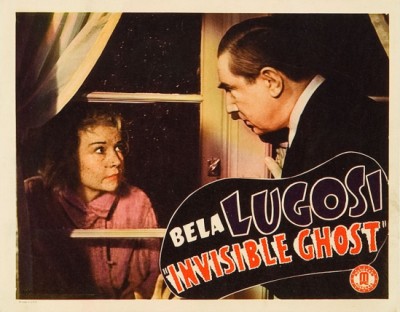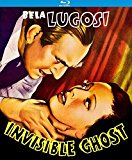| Reviews & Columns |
|
Reviews DVD TV on DVD Blu-ray 4K UHD International DVDs In Theaters Reviews by Studio Video Games Features Collector Series DVDs Easter Egg Database Interviews DVD Talk Radio Feature Articles Columns Anime Talk DVD Savant Horror DVDs The M.O.D. Squad Art House HD Talk Silent DVD
|
DVD Talk Forum |
|
|
| Resources |
|
DVD Price Search Customer Service #'s RCE Info Links |
|
Columns
|
|
|
Invisible Ghost
What's great about this new Kino Blu-ray is its revelatory HD transfer. Neglected for more that 70 years, it's not perfect and seems to be a composite of elements. About two-fifths seems derived from the original nitrate camera negative and the rest from a secondary 35mm source, but even that's light years ahead of anything released since its last reissue, probably 65-plus years ago.
That Invisible Ghost here looks like an actual movie, audiences can at long last fairly compare it alongside other ‘40s horror titles. Though fast, cheap, and wildly nonsensical, it's probably the best-directed of all the Poverty Row horror films. (Edgar G. Ulmer's 1944 Bluebeard isn't in the running, as it's really closer to a period noir.) Directed Joseph H. Lewis (Gun Crazy, Terror in a Texas Town) infuses Invisible Ghost with much visual flair considering the entire shoot was probably no more than five or six days.
An excellent audio commentary by Tom Weaver and others supplements the disc.
Charles Kessler (Lugosi) is a kindly, gentle man, if a little eccentric. On the occasion of his wedding anniversary, over an elaborate dinner for two, Kessler toasts his long-missing and presumed dead wife as if she were in the room. This distresses Ralph Dickson (John McGuire), the boyfriend of Kessler's daughter, Virginia (Polly Ann Young).
In the kind of loopy plot machinations that often turn up in these cheap horror films, it turns out that a haggard but unquestionably mobile Mrs. Kessler (Betty Compson), following a fatal car accident with her lover, is secretly being cared for in the Kessler basement by Jules (Ernie Adams), the family gardener. Explaining to his wife (Otola Nesmith), Jules doesn't have the heart to inform Mr. Kessler that his wife is still alive. Say what?
Further, there's been a series of unsolved murders at the Kessler estate, though no one seems terribly concerned about this. That evening, Mrs. Kessler wanders outside, and when Mr. Kessler is understandably startled to see his wife through a second-floor window, he goes into a trance, staggers off, and inexplicably strangles the maid, Cecile (Terry Walker), with his bathrobe.
The quick-to-judge cops (George Pembroke and Fred Kelsey) pin the murder on Ralph as he'd dated Cecile prior to falling for Virginia, and had argued the night before. Disregarding all previous murders, hapless Ralph is quickly convicted of capital murder and fries in the electric chair. Mrs. Kessler keeps popping up in windows, hypnotizing Mr. Kessler and leading to more murders, while Ralph's twin brother (!), Paul (also McGuire), arrives to investigate.
The ultra-low budget thrillers of Monogram and rival PRC are notable for scripts so illogical they become almost dreamlike. From its opening titles, over the shadowy image of an ape (!), amusingly pointed out in Weaver's commentary, to Mrs. Kessler's strange fate, first kept by Jules for no clear reason, then boasting a never-explained power over Kessler's will, Invisible Ghost is nothing if not unpredictable. Ralph goes to the chair on the flimsiest of evidence and for the most circumstantial of reasons, and the film's loopy dialogue is highly quotable. One example: When Paul asks a psychiatrist, "is it possible, doctor, for a man to be normal, say, for two or three months at a time, then go completely insane for an hour or two?" The doctor replies, "Oh, yes, it's quite common!"
Though definitely fantastical, the movie is light on horror and structured more like a mystery, more about which in a moment. Lugosi has little opportunity to be scary, and when in his trance state he unsteadily wanders through his home as if inebriated, like a Hungarian Arthur Housman. On the plus side, in nearly every ‘40s role Lugosi was offered he played either a malevolent mad doctor (the Poverty Rows) or a demeaning red herring (everything else). Invisible Ghost for the umpteenth time hauls out the familiar trope of devoted husband Lugosi longing for his dead wife, but here his character is entirely sympathetic. By the end of the picture one genuinely feels sorry for this kindly old man who knowingly wouldn't hurt a fly. In one amusing scene he even reassures the new cook, an elderly lady with no confidence in her abilities, that he genuinely loved her meal. Her spirits boosted, she says "Wait ‘til you've tasted my apple pie!" Hilariously, Lugosi's eyes light up and he practically smacks his laps, rubs his tummy, and exclaims "Yum yum yum!" Nevertheless, his is a highly enjoyable performance. It's theatrical, to be sure, but in this case not flamboyant in his usual manner.
I'd bet money early drafts of the scripts were written so that the murderer's identity was unknown to the audience until at least the halfway point. Clearly Monogram wanted to get their money's worth in casting Béla "Dracula" Lugosi, playing up any and every potential for horror with the actor. The film, however, would have worked a lot better had there been some mystery to the killer's identity. It would have worked better had it made any sense at all.
Director Joseph H. Lewis fully deserves the praised he's received over the years bringing cheap movies like Invisible Ghost to life, at least visually. Where most Poverty Row directors would have been content with the usual boring coverage: locked-down, dull medium wide shots for long takes of dialogue, few close-ups, etc. But Lewis clearly wants to keep his audience interested. Though overdone and repetitive, his camera is often on the move, even going "through" walls from room-to-room. He shoots through the fire of the hearth, into reflections in mirrors, and has the Kesslers gaze at one another through rain-dripped windowpanes. These devices can't improve Invisible Ghost's dumb script, but it makes for a better paced, more involving viewing experience.
Another plus is Clarence Muse as the Kessler's butler. Had the film been made a year later, it's probable the studio would have cast contract comedy relief Mantan Moreland and made the role comic. A former lawyer-turned-actor, the distinguished Muse appeared in major and minor films (including with Lugosi before, in the classic cheapie White Zombie), but always he played his roles with a kind of unpretentious dignity. If Lugosi gives the film its most colorful and entertaining performance, Muse clearly gives Invisible Ghost its best performance. He's funny at times, but mostly what impresses is his relaxed, natural style of acting. His career stretched from Hearts in Dixie (1929), the first big studio all-black feature, to The Black Stallion, a half century later. Probably this reviewer's favorite Muse role is in Frank Capra's underrated Broadway Bill (1934), featuring him in a key part.
Video & Audio
As noted above, lifelong fans of Invisible Ghost have had to contend with awful-looking transfers of terrible prints from uncaring PD sources. Here, at times, the image looks stunning, with excellent detail, inky blacks, and good contrast. At other times a secondary but still fairly decent 35mm source was utilized. It has poorer contrast and shows some wear, but it's still way ahead of any prior home video release. If on a scale of ten PD versions of Invisible Ghost hover around "2," this varies between a "7" and a "10." Optional English subtitles aid viewers trying to make out Lugosi's mangled dialogue, and the disc is region A encoded.
Extra Features
Tom Weaver contributes another fun and extraordinarily informative commentary track, aided by Gary D. Rhodes, Robert J. Kiss and a few others unbilled. Weaver knows his stuff as his book Poverty Row Horrors is essential reading for those interested in the genre. Trailers for several other Lugosi titles (but not this one) are tossed in as well.
Parting Thoughts
Entertainingly goofy but also genuinely well-made for its type and budget level, featuring an amusing Lugosi performance, excellent audio commentary and, best of all, a revelatory HD transfer, Invisible Ghost is Highly Recommended.
Stuart Galbraith IV is the Kyoto-based film historian largely absent from reviewing these days while he restores a 200-year-old Japanese farmhouse.
|
| Popular Reviews |
| Sponsored Links |
|
|
| Sponsored Links |
|
|
| Release List | Reviews | Shop | Newsletter | Forum | DVD Giveaways | Blu-Ray | Advertise |
|
Copyright 2024 DVDTalk.com All Rights Reserved. Legal Info, Privacy Policy, Terms of Use,
Manage Preferences,
Your Privacy Choices | |||||||













